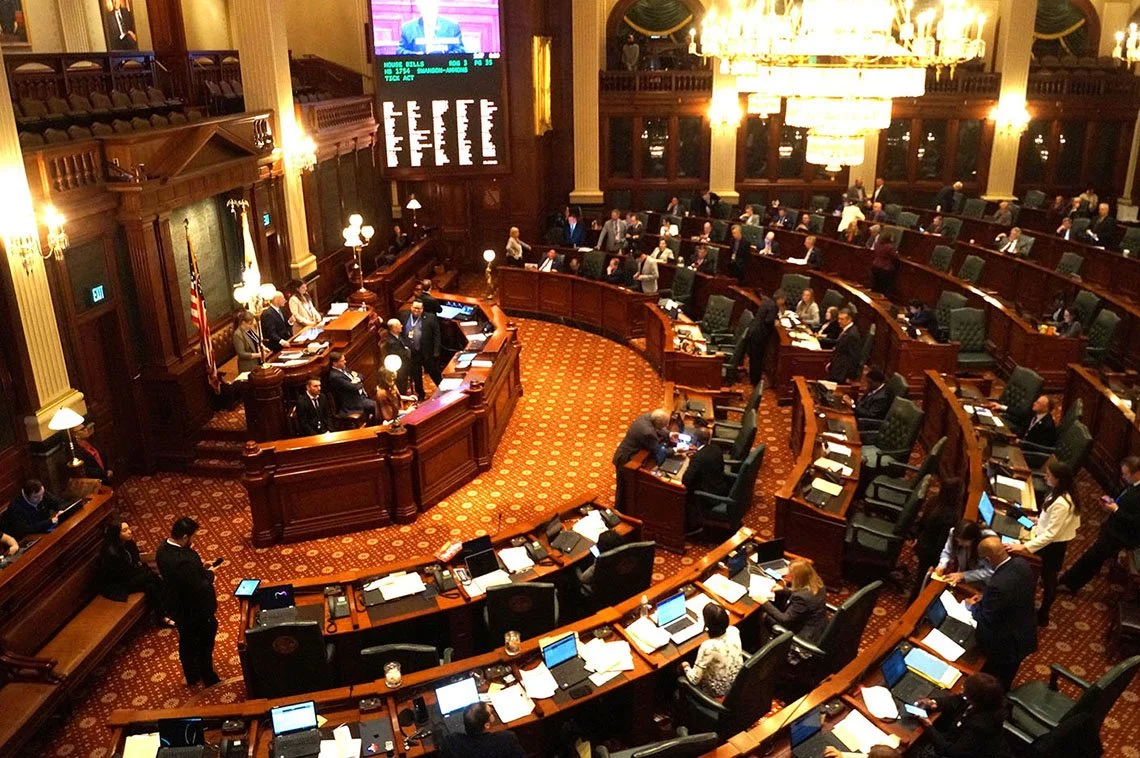.
Mt. Carmel City Council Agenda
Meeting at City Hall.
Princeton woman arrested for Possession of Marijuana
On April 11, 2025, at 2:32 p.m., Gibson County Deputy Eric Powell conducted a traffic stop on a Silver 2012 Mazda in the 600 block of North Main Street after observing the driver, 22-year-old Jacole Williams of Princeton, commit a moving violation. During a roadside investigation, Deputy Powell detected the odor of Marijuana. After a brief investigation, Ms. Williams was placed into custody and transported to the Gibson County Jail, where she was charged with Possession of Marijuana and Possession of Paraphernalia. This is an open investigation.
Assisting Deputy Powell in his investigation was Deputy U.B. Smith.
All criminal defendants are presumed innocent until proven guilty beyond a reasonable doubt in a court of law.
Delays Continue In Case Of Former Deputy
There’s been yet another continuation in the court case of former Wabash County Sheriff’s Deputy Chase Cheadle. Yesterday, Cheadle was in court for a preliminary hearing but special prosecutor Brian Towne and defense attorney Jonathan Turpin agreed to a two-month delay in the case. Cheadle is now due back in court on June 12th at 9am. It’s the fifth straight month, dating back to November 14th that Cheadle’s preliminary hearing has been delayed. Cheadle, who was the sheriff’s department’s canine handler, faces four charges of official misconduct, 1 count of Theft, 1 count of Cruelty to animals, and 2 counts of Animal owner duties. Five of the eight charges are felonies. Cheadle found Kiki unresponsive last July and was arrested following an investigation. He resigned from the sheriff’s department last August 8th.
Native American mascot ban clears the Illinois House, heads to Senate
Bill requires some K-12 schools to pick new mascots, team names, logos
By BRIDGETTE FOX
Capitol News Illinois
bfox@capitolnewsillinois.com
SPRINGFIELD – Illinois K-12 schools may soon be required to pick new mascots to replace those that reference Native American names and imagery.
That would include logos, team names and mascots which 90 schools throughout the state use, such as the Mt. Zion Braves or the Cahokia Comanches, according to legislators.
House Bill 1237 passed in the House on Thursday with a vote of 71-40.
The bill points out specific mascots and names like “Redskins, Braves, Chiefs, Chieftains, Tribe, Indians, or any synonymous term” as those being banned. It also applies to logos with Native American feathered headdresses or traditionally Native American weapons, especially if combined with feathers.
If signed into law, schools would have to have a new mascot chosen by July 1, 2026. Other big changes, that would cost schools money, have a slightly longer delay.
Instead of requiring schools to buy new athletic uniforms and other school materials with new iconography as soon as the bill passes, schools could keep using those old materials until Sept. 1, 2030, as long as the new names and logo designs have been picked out.
There is also an exception for any school whose mascot has a direct tie with a federally recognized tribe and the school gets permission from that tribe to continue using the mascot. That consent would have to be renewed every five years, according to the bill.
This isn’t the first year the bill’s main sponsor, Rep. Maurice West, D-Rockford, has tried to pass the Native mascot ban.
When West tried in 2020, members of the Native American Chamber of Commerce of Illinois asked him to push for teaching Native American history in schools first.
That education bill didn’t make it into law until 2023.
Read more: Bill requiring schools to teach Native American history heads to Senate floor
“This is about the welfare and benefit of our students. It's about not harming our students,” said Andrew Johnson, executive director of NACCI, during a March 20 committee hearing. “It's also not about polls, popularity, contests, anecdotes, tradition, honor, DEI, wokeness or political correctness.”
Advocates said they wanted to focus on K-12 schools because they can choose not to be fans of professional sports teams like the Chicago Blackhawks of the NHL, but they can’t choose not to send their children to school.
This bill also does not apply to universities.
Educators and representatives said the bill would minimize children’s exposure in school to stereotypes about Native Americans.
“At one point, native mascots and logos were the most widespread education about native people in our state,” said Megan Bang, a professor at Northwestern University, during a committee hearing. “This year is our first time as a state to require teaching about native people.”
Read more: Pritzker signs bills expanding protections for Native Americans
“The contradictions of both having educators teach about real Native people, but continue to perpetuate stereotyped images, sets up for educators to have harder times with young people, and sets in motion contradictory learning objectives for young people as well,” Bang said.
When the bill was discussed on the House floor, Republicans were united against the bill in their votes after they came back from an hour-long meeting they took during the bill’s debate.
“If there's bad actors, absolutely let's get rid of them. And I will also just leave you with this question,” Travis Weaver, R-Edwards, said. “This group of people were oppressed, but is oppressed and forgotten better?”
Aaron Golding, member of the Seneca Nation Beaver Clan and member of the Chicago American Indian Community Collaborative, said in March that Native Americans’ input and concerns are often dismissed.
“Our voices and expertise on these issues are ignored,” Golding said. “See, when people are taught about our history prior to 1900 only, without an understanding of our contemporary experiences over the most recent 125 years – and ‘recent’ is pretty loosely said there – it's easy to dismiss us as ghosts of the past whose needs don't matter today.”
The bill now moves to the Senate for consideration.
Capitol News Illinois is a nonprofit, nonpartisan news service that distributes state government coverage to hundreds of news outlets statewide. It is funded primarily by the Illinois Press Foundation and the Robert R. McCormick Foundation.
Sheriff To Appoint Honorary Deputy
Wabash County Sheriff J. Derek Morgan told County Commissioners that is joining other law enforcement agencies next week in appointing DJ Daniel an honorary deputy. Here are Morgan’s comments and a copy of the order he’ll sign next week….
Late Tax Information & Dates
From Wabash County Treasurer Angela Broster:
If you have not paid the first or second installment there is a 3% penalty added to the first payment amount and a 1.5% penalty fee added to the second payment amount. Payments may be made in person at the Treasurer’s office or you may use the drop box in front of the Courthouse. Please contact the Treasurer’s office at 262-5262 regarding the correct amount with penalties.
Certified Notices will be mailed out on Thursday, April 17, 2025, then a Certified Fee of $10.00 will be added to the amount of tax due along with the penalties.
The last day to keep your name out of the paper is Friday, April 25, 2025. Names will be published in the paper on Friday, May 2, 2025. The Treasurer’s Office will not accept personal checks after May 9, 2025.
Wednesday, May 14, 2025 is the last day to pay with a Credit Card on the website listed on the back of the tax bill. Credit Card payments can be made online at www.govtechtaxpro.com.
Friday, May 23, 2025 is the Tax Sale at 10am in the Court Room.
If you have any questions or concerns about your tax bill, please feel free to contact our office.
Princeton man arrested for OWI
On April 9, 2025, at 4:19 p.m., Gibson County Central Dispatch received a report of a vehicle stuck in a field near County Road 800 West and County Road 100 North. The caller provided a detailed description of the stuck vehicle and the driver. Consequently, Communications Officer Amber Lowery dispatched county units to the area. Upon arrival, deputies found a black 2024 Chevy Malibu stuck in the field and identified the driver as 36-year-old Kyle Douglas of Princeton. While speaking with Mr. Douglas, deputies noticed signs indicating that the driver was under the influence of an unknown intoxicant. At this point, Deputy Shawn Holmes initiated a roadside DUI investigation. After the investigation concluded, Mr. Douglas was arrested and transported to the Gibson County Jail, where he was charged with operating a vehicle while intoxicated.
Assisting Deputy Holmes in this investigation were Deputies Wes Baumgart, Quinten Might, Jim Tucker, and Bart Wagner.
All criminal defendants are presumed innocent until proven guilty beyond a reasonable doubt in a court of law.
Mount Carmel man arrested for OWI
On April 9, 2025, at 11:56 p.m., Owensville Town Marshal Steven Parker conducted a traffic stop on a White 2016 Toyota SUV for speeding on State Road 65 near Evening Song Lane. Upon approaching the vehicle Officer Parker detected the odor of Marijuana. At that point, assisting officer, Deputy Michael Bates began a roadside OWI investigation on the driver, 30-year-old Cage Willis of Mount Carmel. Once the investigation was completed Deputy Bates transported Mr. Willis to the Gibson County Jail where he was charged with Operating a Vehicle While Intoxicated.
All criminal defendants are presumed innocent until proven guilty beyond a reasonable doubt in a court of law.
Plans expanding protections for trafficking, sexual assault victims approved by House
Lawmakers seek to outlaw certain chemicals used in cosmetics.
By JADE AUBREY & BEN SZALINSKI
Capitol News Illinois
news@capitolnewsillinois.com
SPRINGFIELD — A bill that would eliminate the statute of limitations for cases of involuntary servitude or trafficking passed the Illinois House on Tuesday.
Current Illinois law only allows a victim of involuntary servitude, involuntary sexual servitude of a minor, or trafficking to pursue prosecution of their offender for up to 25 years after the victim reaches the age of 18. House Bill 2602 would allow victims to pursue prosecution at any time.
Bill sponsor Rep. Anne Stava-Murray, D-Naperville, said the bill, “isn't just about putting an end to sexual assault.”
“It's about delivering justice to survivors and removing people who violate children and teens from the streets,” she said. “With this legislation, we'll be one step closer to delivering justice to childhood survivors of sex trafficking.”
Stava-Murray called the 25-year cap a protection for human traffickers who “really don’t deserve peace of mind.”
The bill passed out of the House unanimously.
House Bill 2805, sponsored by House Minority Leader Tony McCombie, R-Savanna, was also unanimously passed by the House.
This bill would prohibit insurance companies from charging deductibles, copays, or any other costs for any examinations or testing of victims of sexual assault, like rape-kits. McCombie said the bill closes a loophole as current state law prohibits insurance companies from charging for examinations and tests but does not prohibit a company from charging a co-pay.
“This makes sure that victims are not victimized on any level,” she said.
Safe cosmetic products
The House approved legislation that would prohibit businesses in Illinois from manufacturing or selling cosmetic products containing certain chemical ingredients including formaldehyde and mercury.
“We just want to make sure that our body products are safe here in the state of Illinois because some of these contain dangerous chemicals and toxic metals that cause severe health issues,” said bill sponsor Rep. Sonya Harper, D-Chicago.
House Bill 3409 passed on a 69-38 vote.
Several states and the European Union have already banned many of the dozen chemicals included in Harper’s bill.
It’s not clear how such a ban would be enforced in Illinois. According to Rep. Steve Reick, R-Woodstock, that means the bill is “toothless” and shouldn’t move forward.
Dual language education
House Bill 3026, introduced by Rep. Abdelnasser Rashid, D-Bridgeview, would enable the Illinois State Board of Education to develop guidelines schools can use to implement or expand dual language educational programs.
Last year, Rashid passed a bill that mandated the Illinois Advisory Council for Bilingual Education to issue a report outlining potential strategies the state could implement to incentivize and expand dual language education in Illinois schools. The report, published last October, spans 72 pages.
“This report identified several low hanging fruit for us to improve dual language education in our state,” Rashid said. “What HB 3026 does is it implements some of those recommendations.”
The bill does not require schools to implement the guidelines, but instead it allows them to choose their participation status. It passed the House on a vote of 77-25.
Capitol News Illinois is a nonprofit, nonpartisan news service that distributes state government coverage to hundreds of news outlets statewide. It is funded primarily by the Illinois Press Foundation and the Robert R. McCormick Foundation.








